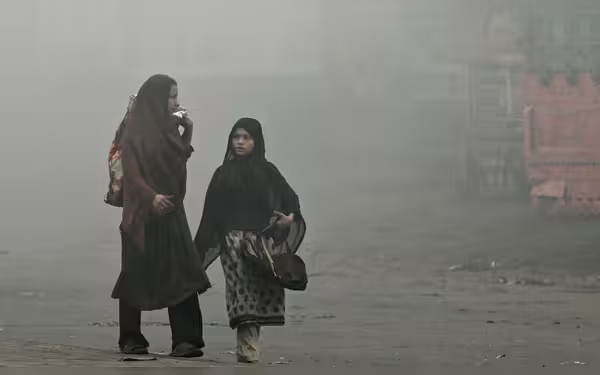Saturday, November 16, 2024 04:48 PM
UNICEF Warns of Toxic Air Threatening 11 Million Children in Punjab
- Over 11 million children under five at risk from toxic air.
- Schools in Punjab closed until November 17 due to smog.
- UNICEF calls for urgent action to combat air pollution.
 Image Credits: dawn
Image Credits: dawnUNICEF warns over 11 million children in Punjab are at risk due to toxic air, urging immediate action to combat severe air pollution.
In recent weeks, the air quality in Punjab has reached alarming levels, prompting serious concerns from health experts and organizations. The United Nations Children’s Fund (UNICEF) has reported that over 11 million children under the age of five are currently at risk due to exposure to toxic air. This situation has been described as a “calamity” by officials, highlighting the urgent need for action to combat air pollution in the region.
As the smog thickens, schools in major cities across Punjab have been closed until November 17, aiming to protect children from the harmful effects of polluted air. Additionally, public parks, zoos, playgrounds, and museums have been closed to minimize exposure to the hazardous conditions. The Air Quality Index (AQI) has soared above 400 in several cities, with Sialkot recording a staggering 774, categorizing the air as “hazardous” to health.
Last week, air pollution levels in Lahore and Multan broke records, leading to numerous hospitalizations, including many children. UNICEF's representative in Pakistan has expressed deep concern, stating, “The air pollution is so severe it is now visible from space.” This alarming statement underscores the gravity of the situation and its potential long-term effects on the health of young children.
Fadil, the UNICEF representative, emphasized that prior to this crisis, approximately 12 percent of deaths among children under five in Pakistan were attributed to air pollution. He warned that the extraordinary levels of smog could have devastating consequences, particularly for vulnerable groups such as children and pregnant women. “Young children are most affected by air pollution because they have smaller lungs and lack the immunities that come with age,” he explained.
The impact of air pollution on developing children is profound. Exposure to particulate matter can damage brain tissue and hinder cognitive development, leading to lifelong challenges. Furthermore, pregnant women exposed to polluted air face increased risks of premature births and low birth weight in their babies.
With the closure of schools disrupting the education of nearly 16 million children in Punjab, the government has shifted to online learning. However, this transition does not address the underlying issue of air quality. Fadil has called on the government to uphold every child’s “right to clean air” and to take immediate action to reduce emissions from agricultural and industrial activities.
He urged authorities to strengthen existing regulations and implement stricter emissions controls to protect children’s health in the long term. The upcoming COP29 conference presents a crucial opportunity for governments to turn their commitments into tangible actions against climate change and air pollution.
The situation in Punjab serves as a stark reminder of the urgent need to address air quality issues, particularly for the sake of our children. It is imperative that both the government and the public take immediate steps to ensure a healthier environment. The health, education, and overall well-being of millions of children depend on our actions today. We must prioritize clean air and sustainable practices to safeguard the future of our youngest generation.













